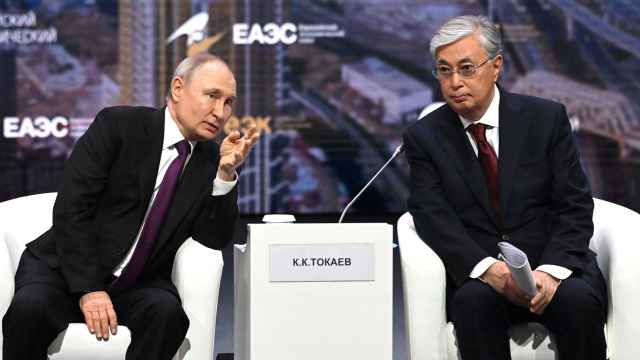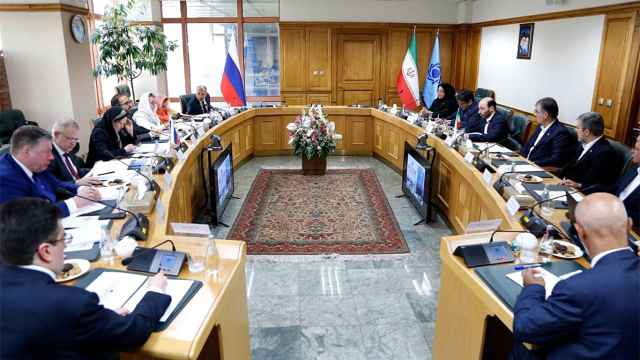Russia is slashing a multibillion-dollar program to modernize its aging civilian ship fleet as mounting war costs and falling revenues push the Kremlin to tighten spending across major industrial sectors.
Funding for the state-backed shipbuilding initiative will be cut by more than 40%, reducing the number of planned new vessels by nearly 70, a presentation by the Industry and Trade Ministry obtained by the RBC news website reveals.
Launched in 2023, the program originally aimed to build more than 260 cargo, fishing, dredging and cruise ships by 2027.
Under the revised plan, just 191 vessels will be delivered through the State Transport Leasing Company’s subsidized leasing scheme, a steep drop from the initial goal.
Total program financing is set to fall from 231 billion rubles ($2.88 billion) to 134.8 billion rubles ($1.68 billion). Cargo and fishing vessels, along with dredgers, are likely to be among the first categories dropped.
The cuts come amid rising construction costs and acute fiscal pressures linked to the war in Ukraine. One-third of federal spending is now directed toward defense, while revenues from oil and gas, the backbone of Russia’s budget, have dropped sharply.
The fleet renewal, launched in 2023 to address the rapid aging of the country's civilian vessels, is being scaled back amid tightening budget constraints, said Oleg Sutyurin, a partner at SBS Consulting.
“The main challenge is a sharp rise in construction costs,” he said.
Much of the funding for the modernization effort was supposed to come from Russia’s National Wealth Fund, a sovereign reserve that has lost two-thirds of its liquid assets over the past three years.
Once valued at $120 billion, the Fund now holds just $52.6 billion in unallocated reserves after repeated withdrawals to plug budget shortfalls and bankroll major infrastructure projects.
By the end of the first half of 2025, Russia’s federal budget deficit had swelled to 3.8 trillion rubles ($47.3 billion), already more than triple the government's original full-year target. June saw a particularly sharp revenue drop, with oil and gas income falling by roughly one-third.
Although the Industry Ministry says the revised fleet program remains viable, maritime experts warn that continued delays could have serious safety implications.
The average age of a Russian civilian vessel is now 40 years. Experts estimate the country needs to introduce 200-220 new ships annually just to maintain operational safety and reliability.
Sutyurin said Russia needs to introduce no fewer than 200 to 220 new ships each year to prevent a rise in accidents caused by aging equipment.
The budget strain has already prompted other industrial cutbacks. In May, Moscow slashed more than 100 billion rubles ($1.25 billion) from key aviation support programs, walking back earlier plans to replace Western aircraft in the national fleet.
Anatoly Artamonov, head of the Budget and Financial Markets Committee in the upper house of parliament, warned last week that securing the additional 2 trillion rubles ($21.3 billion) required annually for defense and security would only be possible through deep cuts to what he called “inefficient spending.”
Analysts say this “inefficient spending” increasingly includes civilian infrastructure and industrial renewal — sectors once viewed as critical to Russia’s long-term resilience.
Mikhail Burmistrov, the head consulting firm INFOLine-Analytics, said that securing budgetary support for the Kremlin’s shipbuilding ambitions remains difficult in light of the sizeable deficit.
A Message from The Moscow Times:
Dear readers,
We are facing unprecedented challenges. Russia's Prosecutor General's Office has designated The Moscow Times as an "undesirable" organization, criminalizing our work and putting our staff at risk of prosecution. This follows our earlier unjust labeling as a "foreign agent."
These actions are direct attempts to silence independent journalism in Russia. The authorities claim our work "discredits the decisions of the Russian leadership." We see things differently: we strive to provide accurate, unbiased reporting on Russia.
We, the journalists of The Moscow Times, refuse to be silenced. But to continue our work, we need your help.
Your support, no matter how small, makes a world of difference. If you can, please support us monthly starting from just $2. It's quick to set up, and every contribution makes a significant impact.
By supporting The Moscow Times, you're defending open, independent journalism in the face of repression. Thank you for standing with us.
Remind me later.






